Removal of a jaw cyst
What is a jaw cyst?
This pathology is a formation that appears as the body's defense against inflammation, infection, mechanical damage to the mucous membrane of the mouth, dental tissues. To prevent the spread of the process, the body forms a capsule with dense walls around the necrosis zone. In cysts, fluid (exudate) with pathogenic microorganisms and decay products accumulates. The diameter of the capsule - from a couple of millimeters to a centimeter or more. Small (less than 5 mm in diameter) are called granulomas. Granuloma, cystogranulomas, and cyst are stages of the inflammatory process in the bone tissue of the jaw.
The initial stages of the disease are often not detected.
What is the danger of a jaw cyst?
The development of the disease can lead to serious consequences. The increase in size threatens fracture (especially of the lower jaw), loss of teeth involved in the inflammatory process, degeneration into a malignant tumor. Exacerbation of the disease leads to the development of periostitis, purulent abscess, or even osteomyelitis. If at this stage the patient does not receive qualified medical care, sepsis can begin. This is an extremely serious condition, characterized by the infection entering the bloodstream and its subsequent spread throughout the body.
Without adequate treatment, the jawbones begin to break down rapidly. This leads not only to the loss of one's tooth but also to the difficulty of further prosthetics - the impossibility of implant placement without bone augmentation.
Why does a jaw cyst occur?
- non-compliance with the rules of oral hygiene;
- caries complications;
- irrational endodontic treatment;
- as a result of injuries;
- irrational prosthetics, which leads to overload of individual teeth;
- pathology of the development of the upper or lower jaw;
- infectious diseases of the mouth and nasopharynx.

It does not matter for what reason the cyst developed. If you do not want to allow complications, you need to contact a dentist as soon as possible, who will diagnose and prescribe treatment.
What types of jaw cysts are there?
- Radicular cyst of the jaw - a cavity tumor around the apex of the tooth root with cystic fluid formed as a result of the inflammatory process of the periapical (root) part of the tooth.
Prolonged growth of the cyst can lead to gradual perforation (formation of holes in the bone) or thinning of the jaw bone, which increases the risk of fracture of the jaw in the segment of the lesion. Radicular cyst often requires surgical treatment, so if you detect unpleasant symptoms, a visit to a specialist is necessary for urgent indications.
- The residual cyst is formed when, for example, after removal of a root in a hole there was a small fragment or the doctor made mistakes at treatment. In an attempt to localize the area, the body limits the source of inflammation. A granuloma forms at the site of the removed tooth. The residual cyst is perfectly visualized in the picture. The diameter of the bag varies - from a few millimeters to a centimeter or more. It is removed only surgically.
- Follicular cysts most often appear in children during the change of teeth. The disease can be asymptomatic. The pathology involves the gums, the capsule that surrounds the tooth that does not erupt. The location of the tumor is well-defined in the image. The gum itself becomes blue. The cyst can cause significant damage to the tooth, characterized by high growth rates. High risk of moving it to neighboring elements of the dentition. Neighboring teeth tilt, sway. Treatment involves resection, truncation of gum tissue.
- Primordial neoplasm (keratocyst) appears from the beginning of the tooth. The reasons for its development are developmental pathologies. Often the capsule is localized at the site of the premolars of the mandible. A dental cyst of this type often recurs. Treatment involves surgery. Further, regular visits to the doctor to monitor the recurrence of the cyst are mandatory.
- The lateral periodontal cyst is small in diameter. It is well visualized in the picture, formed on the side of the tooth root. When lateral periodontitis (periodontal neoplasm) is detected, treatment can be performed without disturbing the body of the tooth.
- The calcifying odontogenic cyst is visible on X-ray examination. The liquid inside the capsule is cloudy due to calcification. The pathology is treated by resection.
- Radicular cyst of the jaw - a cavity tumor around the apex of the tooth root with cystic fluid formed as a result of the inflammatory process of the periapical (root) part of the tooth.
- Prolonged growth of the cyst can lead to gradual perforation (formation of holes in the bone) or thinning of the jaw bone, which increases the risk of fracture of the jaw in the segment of the lesion. Radicular cyst often requires surgical treatment, so if you detect unpleasant symptoms, a visit to a specialist is necessary for urgent indications.
- The residual cyst is formed when, for example, after removal of a root in a hole there was a small fragment or the doctor made mistakes at treatment. In an attempt to localize the area, the body limits the source of inflammation. A granuloma forms at the site of the removed tooth. The residual cyst is perfectly visualized in the picture. The diameter of the bag varies - from a few millimeters to a centimeter or more. It is removed only surgically.
- Follicular cysts most often appear in children during the change of teeth. The disease can be asymptomatic. The pathology involves the gums, the capsule that surrounds the tooth that does not erupt. The location of the tumor is well-defined in the image. The gum itself becomes blue. The cyst can cause significant damage to the tooth, characterized by high growth rates. High risk of moving it to neighboring elements of the dentition. Neighboring teeth tilt, sway. Treatment involves resection, truncation of gum tissue.
- Primordial neoplasm (keratocyst) appears from the beginning of the tooth. The reasons for its development are developmental pathologies. Often the capsule is localized at the site of the premolars of the mandible. A dental cyst of this type often recurs. Treatment involves surgery. Further, regular visits to the doctor to monitor the recurrence of the cyst are mandatory.
- The lateral periodontal cyst is small in diameter. It is well visualized in the picture, formed on the side of the tooth root. When lateral periodontitis (periodontal neoplasm) is detected, treatment can be performed without disturbing the body of the tooth.
- The calcifying odontogenic cyst is visible on X-ray examination. The liquid inside the capsule is cloudy due to calcification. The pathology is treated by resection.
If you have any symptoms, you should consult a specialist?
At an early stage, the cyst does not manifest itself. The primary symptom is discomfort when chewing solid food. As it develops, there may be a protrusion of bone tissue or fistulas on the gums in the area of the tip of the damaged tooth.
In which cases you need to go to the clinic immediately:
- pain increases, which appears even in the absence of pressure on the teeth;
- the appearance of any purulent formations in the mouth near the tooth, edema, or fistula;
- hyperemia and edema of the oral mucosa;
- headache, fever, enlarged lymph nodes;
- facial asymmetry;
- unpleasant odor and taste of pus in the mouth;
- nasal discharge (if the process is in the sinuses);
- the feeling of a grown tooth.
You should not ignore these symptoms if you want to carry out treatment without tooth extraction !!!
When the first symptoms appear, you should immediately seek the help of a dentist !!!
How is a cyst diagnosed?
Treatment of dental cysts begins with diagnosis. And the best way to rule out or confirm the pathology is an X-ray. The degree of surgery and the success of therapy depends on how early the disease was detected, at what stage it is. Because cysts are a fairly common disease of the tissues of the jaw, dentists recommend that patients of all ages, lifestyles, oral conditions regularly visit the dentist's office and be examined by a specialist. If the patient observes signs of a cyst, it is necessary to address them to the doctor, without waiting for the next planned visit.
When is jaw cyst surgery performed specialists in our network of clinics?
- if the cyst has a diameter of more than 8 mm;
- the capsule is formed around a multi-rooted tooth or is located in a hard-to-reach place;
- also, the surgical method is the only effective one if the disease is complicated. In this case, the doctor decides to remove the capsule with the affected tooth;
- if the cyst affects the wisdom tooth, the obstruction of the dental canals is detected or access to them through the gums is impossible;
- at perforation and a crack of a tooth root;
- when the tooth is completely covered with a cystic cavity.
What are the contraindications to surgery?
- the root is immersed in the cyst for more than 1/3 of its length;
- the crown of the tooth is destroyed more than half;
- features of the structure of bone tissue do not allow to perform the operation;
- the patient has impaired immunity or blood clotting pathology.
What methods of surgery are used?
Modern dentistry uses three methods of treating jaw cysts:
- hemisection;
- cystostomy;
- cystectomy;
- the price of the procedure .
Hemisection is a surgical operation to remove a tooth cyst, an injured root and part of the tooth itself. A crown is placed in place of the extracted tooth. This method is used when it is not possible to save the affected areas.
Cystotomy - removal of the anterior wall of the cyst, if the formation is large. If the growth has formed on the lower jaw, the base must be thinned for surgery. If the upper jaw is affected, the bony floor of the nasal cavity should be destroyed. After such an intervention, a long and difficult rehabilitation is required.
Cystectomy is a complex but most effective method of cyst removal.
It has a number of advantages:
- only the tissues damaged by a cyst are removed;
- the removal process takes a short period of time;
- short rehabilitation period.
How is the preparation and method of performing cystectomy?
Before cystectomy, the doctor examines the oral cavity. Neighboring teeth with a cyst are examined for electrical excitability, and in the absence of a reaction is treated.
X-rays provide information about the location of the roots and their location relative to the tumor.
There is a specific method of preparation for this operation - depulpation of teeth whose root system is in the area of the cyst.
Cystectomy is performed under general anesthesia, which not only relieves pain but also exsanguinate the operating field. Then the following measures are performed:
- bone exposure;
- gaining access to the cyst;
- removal of the formation (in the case of association with the root, its resection is performed);
- antibacterial treatment of the bone cavity;
- stitching.
To prevent the appearance of a hematoma, a pressure bandage is applied to the operated area, which is removed after 5-7 days.
Cystectomy of a cyst of the jaw is a complex procedure that requires highly qualified surgeon. Oral and Maxillofacial Surgeons of our Clinic in Kyiv has such qualifications and extensive practical experience in conducting such operations and are the best specialists in Ukraine in this area.
In the future, the patient is prescribed treatment with anti-inflammatory, anti-allergic and analgesic drugs.
How is the rehabilitation period?
The recovery period of soft tissues - up to 2 months, bone tissue - 5-6 months. The duration depends on the characteristics of the body and compliance with medical recommendations:
- mechanically and thermally sparing diet (exclude the use of spicy, sour, hard, hot food, carbonated beverages);
- give up alcohol and smoking;
- drug therapy.
Dentists consider cystectomy to be the most effective and conservative method in Ukraine, which is recommended for everyone in the absence of contraindications.
Only a dentist can make the correct diagnosis and choose the optimal method of treatment, so if you have any concerns, see a doctor immediately and do not forget to undergo preventive examinations every six months.
Our advantages
Our services
Choose the nearest clinic to you
ISO certificates
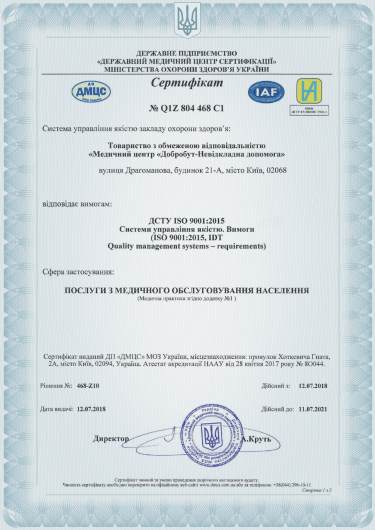
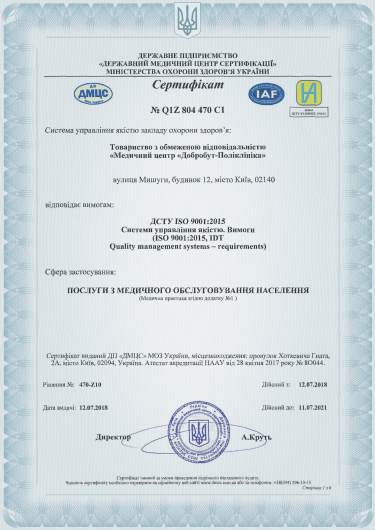
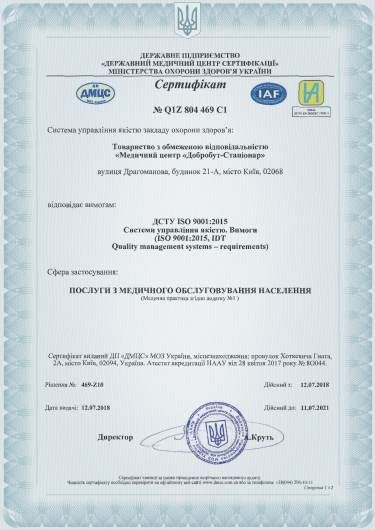
Accreditation certificates
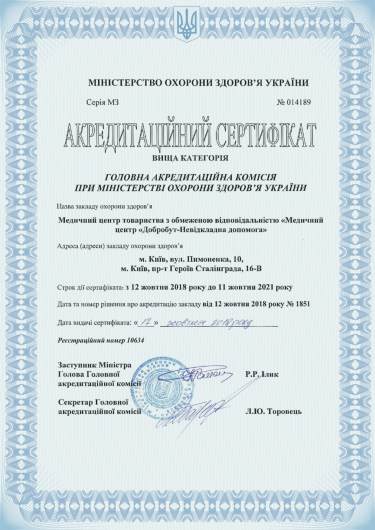
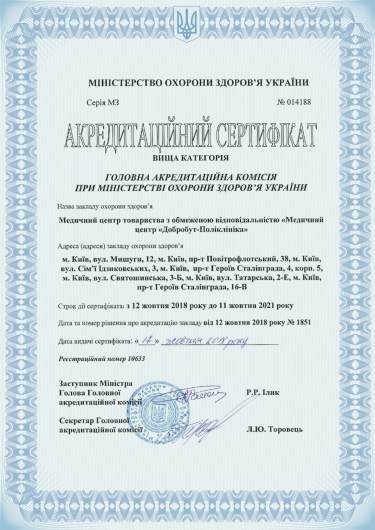
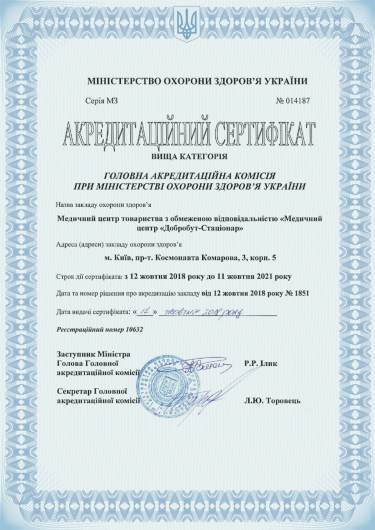
Medical practice licenses
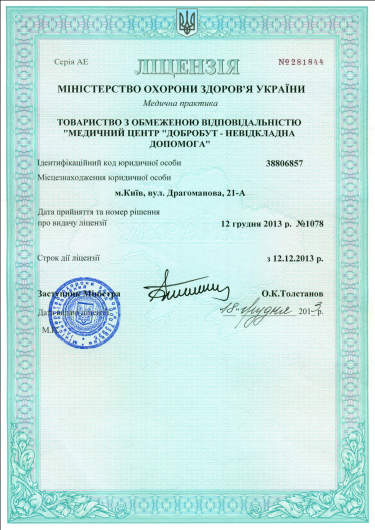
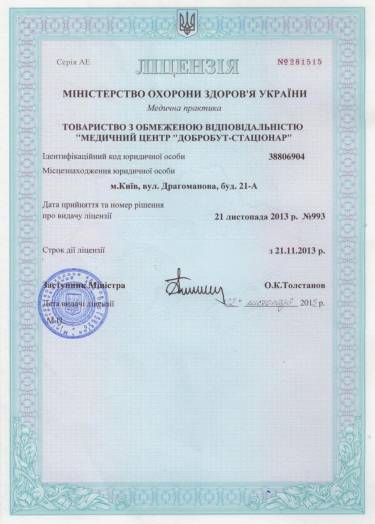
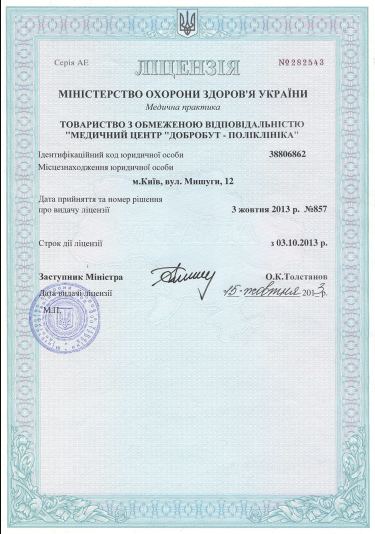








%402x.png)
%402x.png)
